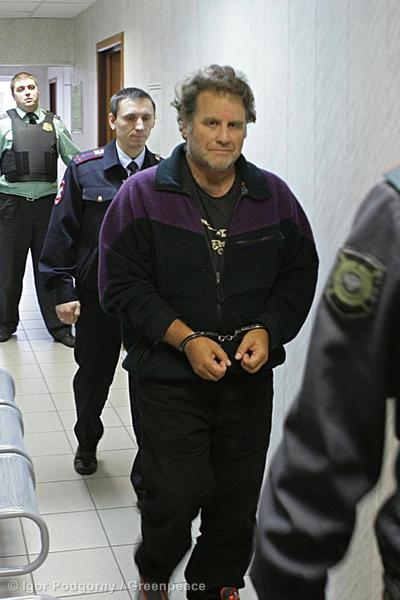The global, political drama behind the Greenpeace protest at the Gazprom oil platform (EarthDesk, October 2) is being obscured by the news media’s longstanding fascination with cartoonish Russian and Soviet officials. Think Vladimir Putin shirtless, Leonid Brezhnev’s eyebrows, and Nikita Kruschev brandishing his shoe at the United Nations General Assembly.

Captain Peter Willcox arrested by Russian authorities. © Igor Podgorny / Greenpeace
Last week, 29 of the Greenpeace Arctic 30 were released on bail after serving almost two months for attempting to scale Gazprom to unfurl a banner. The 30th, Australian Colin Russell, was denied bail by a St. Petersburg judge for reasons that are uncertain.
Putin’s clumsy handling of the controversy dominated the news. First the Arctic 30 were charged with piracy, then hooliganism. Pirates and hooligans! — those clever but primitive Russian authorities. Some stories linked the case to the upcoming Olympics in Sochi. Political bungling by the home nation during the countdown to the global games is a time honored news angle.
Not one story addressed the tense, militaristic race between the U.S. and Russia to dominate Arctic oil and mineral reserves.
In the October 8 EarthDesk we wrote:
The recent Greenpeace action in the Russian Arctic is no garden variety, monkey wrench gag launched from the organization’s considerable arsenal of civil disobedience tactics. In fact, it is the leading edge of protest against a new Cold War rolling out at the top of the world, ushered in by climate change.
If you are a student of history, or old enough to remember, you recognize the posturing, and worse, in which the United States and Russia are now engaged. Their competing assertions of sovereign global rights, as melting Arctic ice gives way to new navigation routes, and oil and mineral riches, have all the hallmarks of the Fail-Safe days of the 1950s and 60s.
But typical of the recent Greenpeace stories is a 641-word, November 22 Washington Post article that found these 9 words to describe the real issue:
[A] Greenpeace protest against oil drilling in the Arctic . .
Meanwhile, the Arctic region is fodder for a new era of American-Russian rhetoric, finger-pointing and brinkmanship too reminiscent of the Cold War. President Obama’s policy is to rattle loudly the American saber, by way of his National Strategy for the Arctic Region:
We will enable our vessels and aircraft to operate, consistent with international law, through, under, and over the airspace and waters of the Arctic, support lawful commerce, achieve a greater awareness of activity in the region, and intelligently evolve our Arctic infrastructure and capabilities, including ice-capable platforms as needed. U.S. security in the Arctic encompasses a broad spectrum of activities, ranging from those supporting safe commercial and scientific operations to national defense.
President Putin has thrown down his own gauntlet on the Arctic:
The US has practically started the second stage of its plan to set up a global missile defense system and there are probes into the possibility of NATO’s further eastward expansion. The danger of militarization of the Arctic exists. Our task – to create a mobile, well-equipped armed forces ready to respond promptly and adequately to any potential threats to peace, to protect our citizens, our allies, the future of our nation and state.
(Additional EarthDesk coverage: Sitting on Top of the World: The Rush to Exploit the Melting Arctic and Cold War at the Top of the World.)
On October 21, the Kingdom of the Netherlands filed a complaint with the International Tribunal for the Law of the Sea seeking release of the 28 activists and 2 journalists, and of the Greenpeace vessel Arctic Sunrise, which was seized by Russian authorities. On November 22, the Tribunal ruled:
- The Russian Federation shall immediately release the vessel Arctic Sunrise and all persons who have been detained, upon the posting of a bond or other financial security by the Netherlands which shall be in the amount of 3,600,000 euros, to be posted with the Russian Federation in the form of a bank guarantee
- Upon the posting of the bond or other financial security referred to above, the Russian Federation shall ensure that the vessel Arctic Sunrise and all persons who have been detained are allowed to leave the territory and maritime areas under the jurisdiction of the Russian Federation
Russia replied it will ignore the ruling. See the Tribunal documents and video of the proceedings here.
The Greenpeace protest at the Gazprom oil platform was not a stunt to attract attention. It was a style of dramatic civil disobedience that activists have employed for generations. But the worldwide clamor to dismiss the charges against the Arctic 30 should not lull one into thinking Russia’s reaction to the Greenpeace protest would have played differently anywhere else, particularly in the United States.
Consider the harsh U.S. Federal prosecutions against: the AETA 4 for use of “the Internet to find information on bio-medical researchers”; Sister Megan Rice, the 84 year-old nun who with two others easily broke into a nuclear facility; and Aaron Swartz, who attempted to release thousands of scientific research documents to the Internet from a computer at MIT, and was hounded by an ambitious U.S. Attorney until Swartz committed suicide at age 26.
Prosecution is a natural consequence of civil disobedience. But history teaches us that most often civil disobedience is a natural consequence of injustice.
That is the real story.









